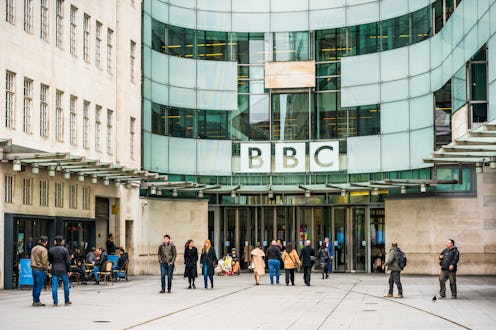Entertainment
What A BBC Paywall Would Mean For 'Gavin & Stacey,' 'Strictly,' & Your Other Faves

If you've been following UK news of late you're probably aware that there's been much discussion regarding the BBC licensing fee, how much it costs, and whether or not it's outdated. Some have suggested a Netflix-style paid subscription service would be better than the current system. In response, the network's chairman Sir David Clementi has warned that some of the BBC's most popular shows might be at risk if the broadcaster's services are put behind a paywall. And you'll be very sad to hear which ones.
Clementi was in Salford yesterday (Feb. 12) to discuss his concerns regarding the BBC's future output should the licensing fee rules change. He begun his speech by saying, "The BBC is a great national asset; a diminished BBC is a weakened United Kingdom."
He continued: "Sitting behind a paywall, it would no longer be the place that brings the country together for the Strictly final, or Gavin & Stacey on Christmas Day, or the Armistice Anniversary or Holocaust Memorial."
On top of calls for the BBC to be subscription-based, on Feb. 5, the government announced it was launching a new consultation under Cultural Secretary Baroness Nicky Morgan on whether failure to pay the licence fee should no longer be a criminal offence.
Writing for the Daily Mail, Morgan said "It is clear that many people consider it an anachronism that you can be imprisoned effectively for not paying for your TV licence," adding: "We need to think carefully about how the BBC ... can stay relevant in the years ahead."
Others pro changes to the licensing fee include ex-footballer and TV sports presenter Gary Lineker who spoke to the Guardian in support of making the licensing fee voluntary. "I would make the licence fee voluntary", Lineker said. "I've always said for a long time, I would make it voluntary. I don't know the logistics of how it would work."
However, many media analysts have warned of the potential risks involved in changing the way in which the BBC makes money. Claire Enders, of leading TMT research company Enders Analysis, has been vocal in her concerns on the matter. Enders described the government's movement towards relaxing penalties for the non-payment of licensing fees as "pincer movement to cause the BBC to wither and implode."
Although remains to be seen what the outcome of Baroness Morgan's public consultation will be, the future might well hold a very different BBC.
This article was originally published on